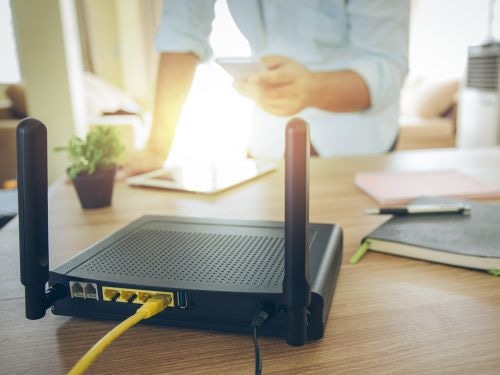Which Router Should I Buy?
Posted on May 18, 2020 By Alison P
Looking to improve the Wi-Fi in your home? Maybe your current router just isn't cutting it for the amount of devices you have. Perhaps you're laying the groundwork for some Smart Home upgrades, or maybe you're looking to save some money on your monthly ISP bill by owning a router instead of renting one. In any case, choosing the right WiFi Router for your needs is not something to take lightly.
Think of a router as an "Internet dispenser" for your Wi-Fi devices. While it's true that your Internet connection is handled by a modem, your router takes that connection and portions it out into smaller pieces to allow computers, smartphones, and any other Wi-Fi devices to get online. Those of you less tech-savvy readers are probably wringing your hands in panic at the thought of having to select the backbone of your home's every Wi-Fi operation, but fear not - this article was written with you in mind. By the time you're finished reading, you'll feel much more confident in journeying down the router route!
Single Band Router
The single-band router is the most basic type as well as the most inexpensive. This router's band operates at a frequency of 2.4 GHz, which is compatible with virtually all Wi-Fi devices. It's also the same frequency at which many other devices operate, including garage door openers, microwaves or cordless phones. This can unfortunately result in it becoming overwhelmed with signals, which can translate to a slower Wi-Fi speed. If you intend to use your router for a Smart Home network, a single band is NOT the type of router for you! This router is best for use with simple applications like:
- Browsing the web
- Chatting online
- Sending and receiving emails
If you're planning on uncomplicated internet usage, and a low upfront cost is a priority, a single-band router may be worth considering. However, if you're planning on using your Wi-Fi for more high-demand operations like Smart Home applications, you're better off with a different variety.
 Dual Band Router
Dual Band Router
As you may have deduced, the next step up from a single-band is a dual-band router. It operates at 2.4GHz as well as 5GHz, giving it greater versatility and more signal strength. A dual band router is a good choice for homes with more heavy-duty Wi-Fi usage like:
- Multiple-device gaming
- Video streaming
Be sure to select a simultaneous dual band as opposed to a selectable dual band - it'll provide two separate bands at the same time to avoid any interference. The 5GHz band covers a shorter range, but it's perfect for creating a faster connection for gaming and high-quality video streaming, plus the combined forces of the two frequencies can cover a large area. As far as price goes, they are more expensive than a single-band router, but most are relatively affordable with many available for under $100.
Tri-Band Router
A tri-band router may be the perfect choice for you if you live in a home overflowing with simultaneously-used Wi-Fi devices. This includes devices like:
- Phones
- Tablets
- Laptops
- Streaming Systems
- Gaming Consoles
Tri-band routers host one 2.4GHz signal and two 5 GHz signals, giving even greater versatility and better speed, plus it automatically sorts devices into different networks based on need. Keep in mind that a tri-band router operates under the assumption that it's got a high-speed cable internet connection to work with, so make double sure that your internet speed is fast enough to accommodate it. This model is also more expensive than a dual-band, so this may not be the best choice if your top priority is something with a low upfront cost. If, however, your main motive is faster connection speeds for multiple devices, this model should be prioritized over the dual band for sure!
 MU-MIMO
MU-MIMO
The crme de la crme of routers, this device's name stands for "Multi-User, Multi-Input Multi-Output." Unlike the other types of routers that end up switching devices between bands, a MU-MIMO maintains simultaneous connection to several devices with no switching. This type of router increases download speeds and provides smoother streaming for videos and gaming. While a MU-MIMO sounds like an easy choice for the best router, there are a few caveats. For one thing, make sure your client supports this type of router; just like the tri-band routers, a MU-MIMO router requires fast Internet speeds in order to work properly. All devices must be Wave 2 certified - that is, compatible with 802.11ac wireless standard and a 5 GHz Wi-Fi frequency - so be sure to double-check router and network devices.
Ready to find the perfect router for your home? Get it for the guaranteed lowest price at P.C. Richard & Son!